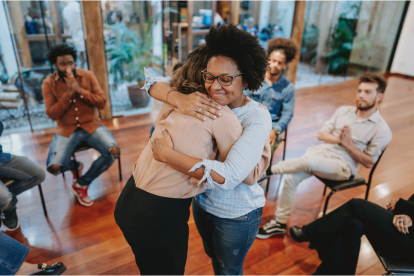Identifying and Managing Bipolar Triggers During the Holiday Season

The holiday season can be challenging for anyone. For someone with bipolar disorder, this time of year is full of intensified triggers. The holidays can be disastrous for mental health, from social anxiety and stimulating parties to isolation and disrupted sleep schedules. It’s important to identify triggers for mania and depression, avoid them when possible, and manage them when not.
Bipolar disorder causes disruptive moods cycling between depression and mania. Treatment is effective, and you can manage this condition and your moods. The right combination of medication, therapy, and coping and lifestyle skills can make life with this condition much more manageable.
Management of bipolar disorder is a balance that can easily be disrupted by external factors. The holiday season is difficult for many people but especially those with mental illnesses. An effective way to cope during this time is to be able to recognize and deal with mood triggers in positive, productive ways.
How Can the Holidays Impact Bipolar Disorder?
Many people, with and without mental illness, find this a trying time of year for many reasons:
- High expectations that often result in disappointment
- Stressful family gatherings
- Exacerbated grief and loneliness
- An overcommitted schedule
- Social anxiety
- Financial stress and expectations
- Temptations to drink or use other substances
According to a National Alliance on Mental Health survey, 64% of people with mental illness experience worsening symptoms during the holidays. With one-quarter of people admitting that this time of year exacerbates their existing conditions, it’s important to recognize triggers that adversely affect your well-being. All of the factors that can make the holidays difficult for anyone have the potential to trigger and worsen your bipolar moods and symptoms.
What Triggers Bipolar Episodes During the Holidays?
Triggers are unique to every individual, but there are also commonalities. Many of the typical triggers for depression and mania intensify during the holidays. Some of the triggers that you may experience during the holidays include:
- Sleep disruptions. Poor sleep is a common trigger for manic episodes. Feeling as if you need less sleep can also be a warning sign of impending mania. Holiday events and chores can disrupt a regular sleep schedule, exacerbating this issue.
- Effects of medications. You may be on an antidepressant for depressive episodes, but these medications can also trigger mania. If you have this issue, talk to your doctor about it. A solution may include adding a mood-stabilizing drug or trying a different antidepressant.
- Stress. Stress is a common trigger of depressive episodes. The holiday season can be more stressful than usual. You may be facing a busy schedule, family events that lead to conflict, a lot of extra chores, and financial stress due to the expectation of spending money on presents.
- Alcohol consumption. Holiday parties and dinners often involve a lot of drinking. Bipolar disorder and substance use disorder often co-occur, making this a more challenging time. Whether you struggle with drinking or not, consuming alcohol during the holidays could trigger a mood change.
- Seasonal changes. Seasonal Affective Disorder (SAD) is a mental health condition that differs from bipolar disorder. However, colder, shorter days can trigger bipolar depression too.
- Major life events. Any time of year, a positive or a negative life change can trigger mania or depression. Losing a loved one, for instance, could trigger depression. You may have lost a loved one a while ago, but the holiday season can intensify those feelings.
Call For a Confidential Phone Assessment.
619-466-0547How to Recognize Your Triggers
While triggers are common in people with bipolar disorder and often intensify during the holidays, it is essential to recognize what triggers you. Personal triggers are what will lead you to a manic or depressive episode.
If you have been through residential care or are working with a therapist, you have probably begun working on trigger identification. Keep up with this and be vigilant, especially this time of year. If you have not spent much time reflecting on the lead-up to mood episodes, it’s time to be more reflective.
One way to identify your triggers is to keep a mood journal. You can do this the old-fashioned way or by using one of many apps designed to track moods. A daily record of sleep, relationships, drinking and diet, exercise, and significant events will show how these factors coincide with how you feel and shift moods.
By identifying the unique situations that trigger your mood changes, you can take better control over your mental illness. This is especially important during the holidays when everything feels more intense.
Coping With Triggers During the Holiday Season
Knowing what tends to trigger depression or mania and your personal factors, you can take charge of the holidays and your mental health. Here are some ideas for coping with what triggers your mood shifts.
- Maintain good physical health. The better your body feels, the easier it is to manage difficult situations, moods, and triggers. One of the essential components of this for bipolar disorder is sleep. The holidays can be very disruptive, but do what it takes to stick with a regular sleep schedule, getting to bed and waking up at the same time every day. Additionally, it would help to focus on eating well and getting plenty of exercise to lower stress.
- Stick with routine. A routine is essential not just for sleep but for most aspects of your life. Studies show that bipolar patients with daily routines have fewer new manic or depressive episodes. People with bipolar disorder may be more sensitive to circadian rhythms and disruptions to their routine. The holidays will inevitably disrupt your schedule to some extent, but the more you can manage to stick to your routine, the better.
- Avoid alcohol. Alcohol is abundant this time of year, and you’re likely to feel the pressure to drink. It’s best for managing moods to avoid any substance that alters mood. One or two drinks on occasion are probably fine, but if this is one of your triggers, it’s best to go sober for the duration of the holidays.
- Minimize stimulation. All the parties, events, lights, and other stimulating aspects of the holidays can trigger mania. There’s no reason to avoid all holiday events but pick and choose those most important to you. Avoid the most stimulating events and those you know may trigger mania for you. For instance, if loud music is triggering, avoid a Christmas concert and go to a small party instead.
- Stick with family and friends. If you begin to feel depressed, it’s tempting to isolate yourself. The better solution is to spend time with the people you love and trust. Spend time with family and friends and rely on this social support to keep you balanced and healthy. If you’re unable to travel to be with family, connect by phone or online to stay in touch.
- Prepare for social events. If you are triggered by social anxiety or the stimulation of parties, prepare in advance. It may not be necessary to skip holiday parties if you plan. Have a friend to attend with you and plan for how and when you’ll leave.
- Manage expectations. One of the biggest reasons the holidays disrupt mental health for so many people is the expectation level. It’s meant to be a joyous time of year, and you’re expected to find the best gifts for your family. You’re supposed to have fun and do all the seasonal events. Some people can keep up with it all, but many cannot. Let go of these expectations and do what makes you happy and healthy. If this means ultimately bowing out of the holidays, do it and don’t feel guilty about it.
The holiday season is rife with pitfalls for mania and depression. Know your triggers and manage them to get through this time in good health and with fewer (or no) episodes. Keep up with therapy and, if necessary, go back to residential care for some time. Do whatever it takes to stay healthy going into the New Year, for the sake of your mental health and well-being.






